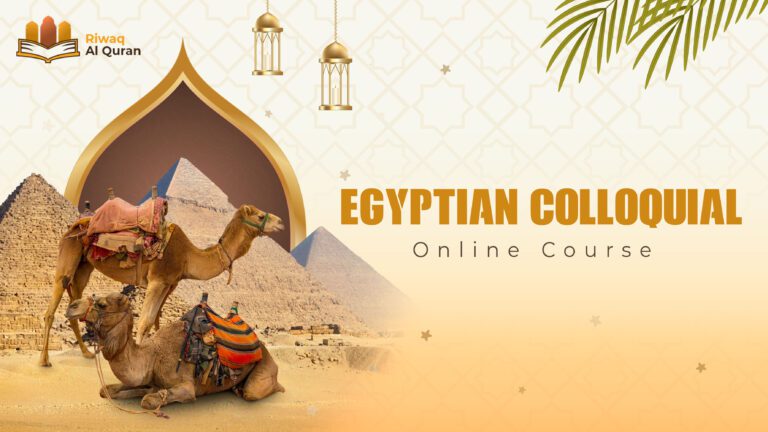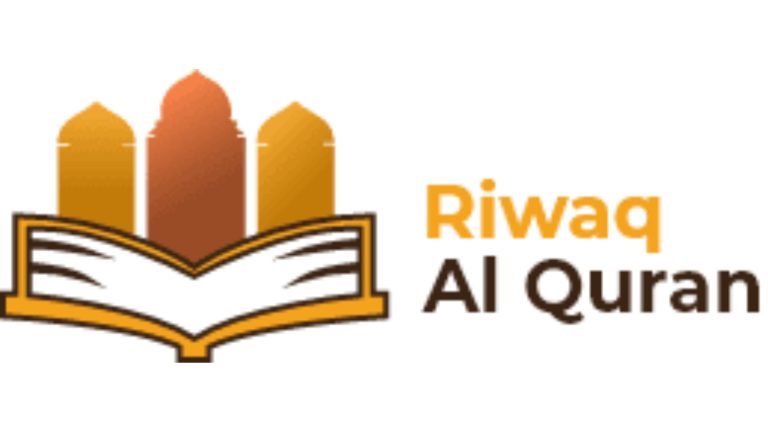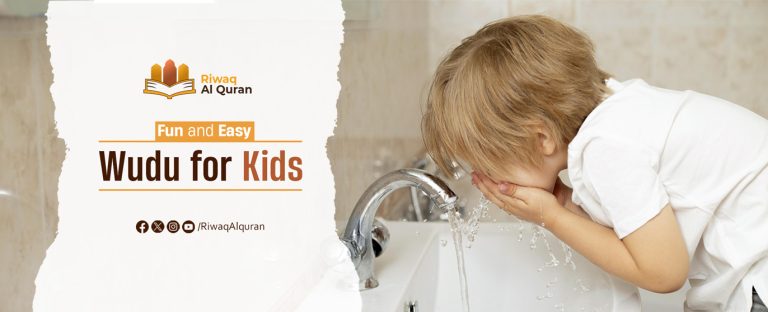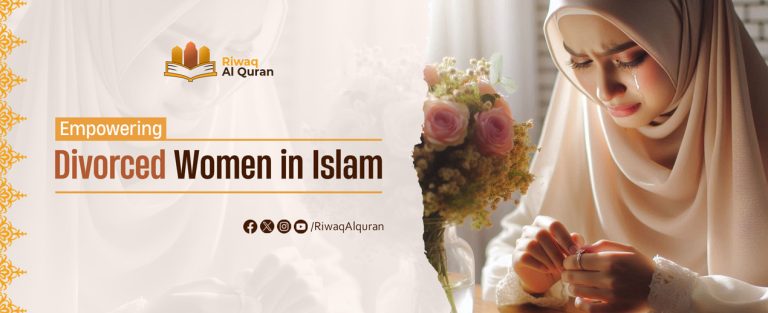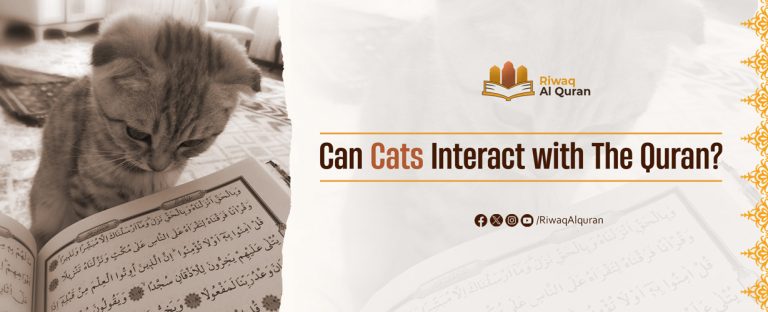Table of Contents
Benefits of Taharah and Its Importance In Islam
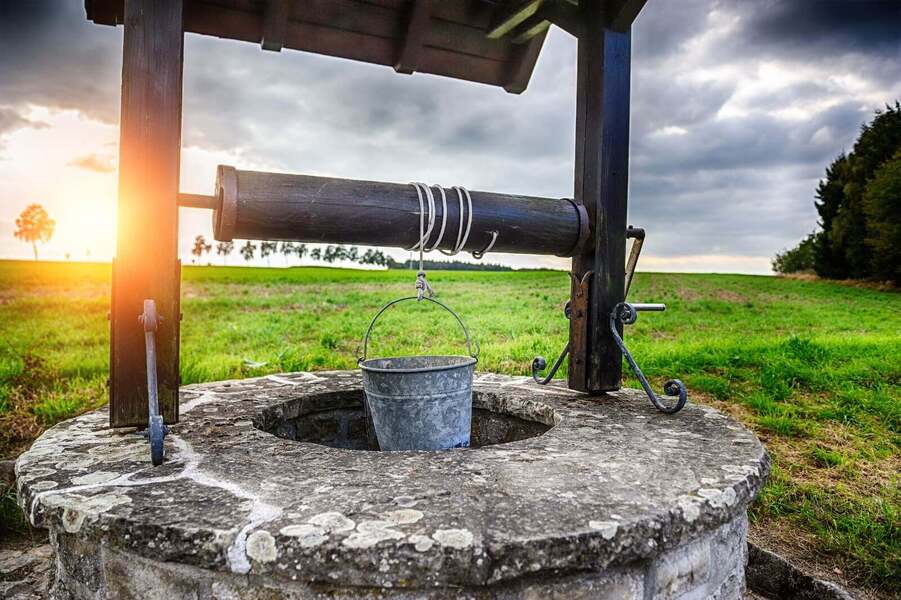
All of the world’s processes are intertwined with human mythology and human needs such as eating, sleeping, and washing are drawn from natural cycles. The digesting system in humans does not retain any hazardous toxics in the body, similar to how the cycle of keeping clean is prominent in the structure. Similarly, birds and mammals have their own methods for removing dust specks from their skin; birds are often seen picking at their feathers for a good wipe.
The oceans and rivers are built in such a way that waste is ejected from them, allowing the pure essence of water to flow freely. Humans are the same way. For a clear mind, clear eye, and inventive thought, he must keep himself clean.
The Holy Prophet PBUH saw it is proper to include Taharah, or the act of purification, as one of Islam’s essences, because the first and foremost advantage of taharah is to clean, which has a direct link to Islam’s creed, which was spread with the goal of cleansing souls from the dirt of sin’s impurities, keeping in check that the heart is always clean from jealousy and impure love for others.
It is a divine two-way process – taharah, one working outside, and the other one improving inside. The trend to observe here is that the more you do taharah on the outside, on the frontal body, the more it cleanses you on the inside, which is the magical connection and one of the major benefits of taharah.
Have you Heard about Taharat Meaning in Islam?
As stated in the sayings of the Holy Prophet PBUH that the place of taharah occurs as the half of iman.
“The Messenger of Allah (ﷺ) said: “Purification is half the Iman” [Muslim].
It would take a lot of thought to figure out how taharah is half of iman, yet it can be done in both the worldly and the hereafter realms.
The main worship to Allah, through the guided pillars, is prohibited in Islam without ablution, which makes it half of the iman and shows us benefits of taharah for Muslims. The other concept is to insist on the fact that entering Jannah through its doors on the Day of Judgment is not permissible nor accepted with any impurities, thus this act of purification and cleansing gets reflected throughout the muslim’s life and will help him attain higher posts in akhirah.
The principle is supported in this variation of the hadith, which combines the two benefits into one, providing us with an unambiguous instruction.
“Sa’eed bin Musayyab said: ‘Indeed Allah is Tayyib (good) and he loves Tayyib (what is good), and He is Nazif (clean) and He loves cleanliness, He is Karim (kind) and He loves kindness, He is Jawad (generous) and He loves generosity. So clean’ [Jami` at-Tirmidhi]
The benefits of taharah include being generous, keeping one’s surroundings clean, keeping one’s tongue free from lies, and all of the other things that Allah values, since HE is clean according to the Quran.
Why Do We Have a Need to Know What is Taharah in Islam?
The recital of Quran will give you an insight on the fact that it is indeed salah that is the way to the paradise. Allah has mentioned five times of worship and each time the person thinks of preparing for Salah, the ritual of taharah has to be maintained with water being splashed over the body parts.
The style and ritual of the wudu will definitely make you question, what is in the depth of it? Is it a mere freshening up of the body parts, or is there a wisdom behind water touching down on the known parts of the body? How does it all end up in a cleansing process?
If you do a search on the term “hydrotherapy,” you’ll learn that it refers to the use of water both inside and externally for therapeutic purposes, such as colonic cleaning and contrast therapy. With the help of the power of water, the entire deal is to make the individual healthy and rid him of all his problems.
Imagine a Muslim who avoids all of the world’s impurities and then prays when performing wudu. Would you measure that water to heal him of all ailments and make him healthy and unaffected by all of the world’s atrocities?
This is how every religion has revered the element of water and alluded to using it for religious purposes. Take for example baptism for Christianity or grihya sutras for the Hindus. As a result, it’s simple to see that, while Islam has little to do with magic, the water droplets sprinkled in wudu have a direct relation to the purification of the soul, which is inaccessible to the naked eyes.
Importance and Benefits of Taharah in the View of Islam
Any civilization cannot disregard the importance of cleanliness and hygiene. Every religion and civilization emphasizes the value of hygiene. Historically, cleanliness has been seen as one of the most essential indicators of a civilizations’ or society’s progress.

Both physically and spiritually, Islam places a high value on cleanliness and purity. Spiritual purity is associated with bodily cleanliness and purity in Islam. Cleanliness is also referred to as an essential component of religion.
The Holy Quran has numerous passages that emphasize the significance of cleanliness. Allah, for example, says:
Surely Allah loves those who always turn to Him in repentance and those who purify themselves.” 2:222
The two thoughts of repentance on a spiritual phase and purification on the physical one, together would make a proper connection for an individual to be loved by his Lord and emphazise the benefits of taharah for Muslims. It is prohibited to touch the Mushaf while you are not purified from al-hadath al-akbar (the major ritual impurity) and it is one of the manners of reading Quran to be in wudu state while reading from Mushaf.
Without cleanliness of our body and environment, we cannot experience the spiritual proximity to Allah, and most significantly, faith cannot be completed in the absence of cleanliness and purity, as evidenced by the above few examples from the Holy Quran and sayings of the Holy Prophet.
In both individual and social life, the value of cleanliness cannot be overstated. It is crucial for human health and spiritual development on the one hand, and crucial for environmental development on the other.
A clean and healthy lifestyle contributes to the refinement of a society’s culture and is reflected on many aspects of life, including art, architecture, food, music, and so on.
It leads to a greater level of civilization at the end. As it was mentioned in the times of the Holy Prophet PBUH that Medina was made beautiful to live in and settle down, because the people residing in there were Muslims, whose tradition and values needed to keep clean by the rules of taharah. Thus, to move forward, we would be advancing for the details of physical taharah.
Types of Taharah in Islam
Physical Taharah is divided into two types in Islam, based on the types of impurities, discernible and indiscernible format, i.e. purification from impurities on the individual’s clothes, body, or prayer area from any external source other than the makhrajain (the front and back passages), and the other being purification from impurities from an internal source, the two exiting points of excrement in any human being.
Act of Taharah (Purification) from External Sources

This is the process of cleansing one’s body, garment, or place of prayer of any obvious bodily impurities that would invalidate the prayer, such as blood or vomit, that are easy to see and spot. In this case, purification is accomplished by washing, splashing, or scouring the affected area with water to remove the defiling substance.
Note: Blood from sores, cuts, and scars, as well as vomit pulled from the mouth, are not counted as impureties from makhrajain (the front and back passages), and are thus counted as an external source, making vomit and blood counted as najasah (impurity) without being hadath (ritual impurity), preventing a person from praying and performing similar acts of worship, but only when it is in excess of a coin’s size.
Act of Taharah (Purification) from Internal Sources
The internal sources are the two excrement exits after digestion of food and water, anything that comes out through them are known as “hadath”, and invalidates the status of purity for any individual.
This is the process of cleaning oneself from indescribable filth associated to the body, known in Arabic as Hadath, which hinders a person from praying or performing other acts of worship.
Ritual impurity can affect the entire body, which is referred to as major ritual impurity in this case such as sexual discharge, menstruation, or postpartum bleeding. Ghussl (water showering)is a method for removing it and strengthening an individual’s taharah.
How to act on several types of cleanliness in Islam?
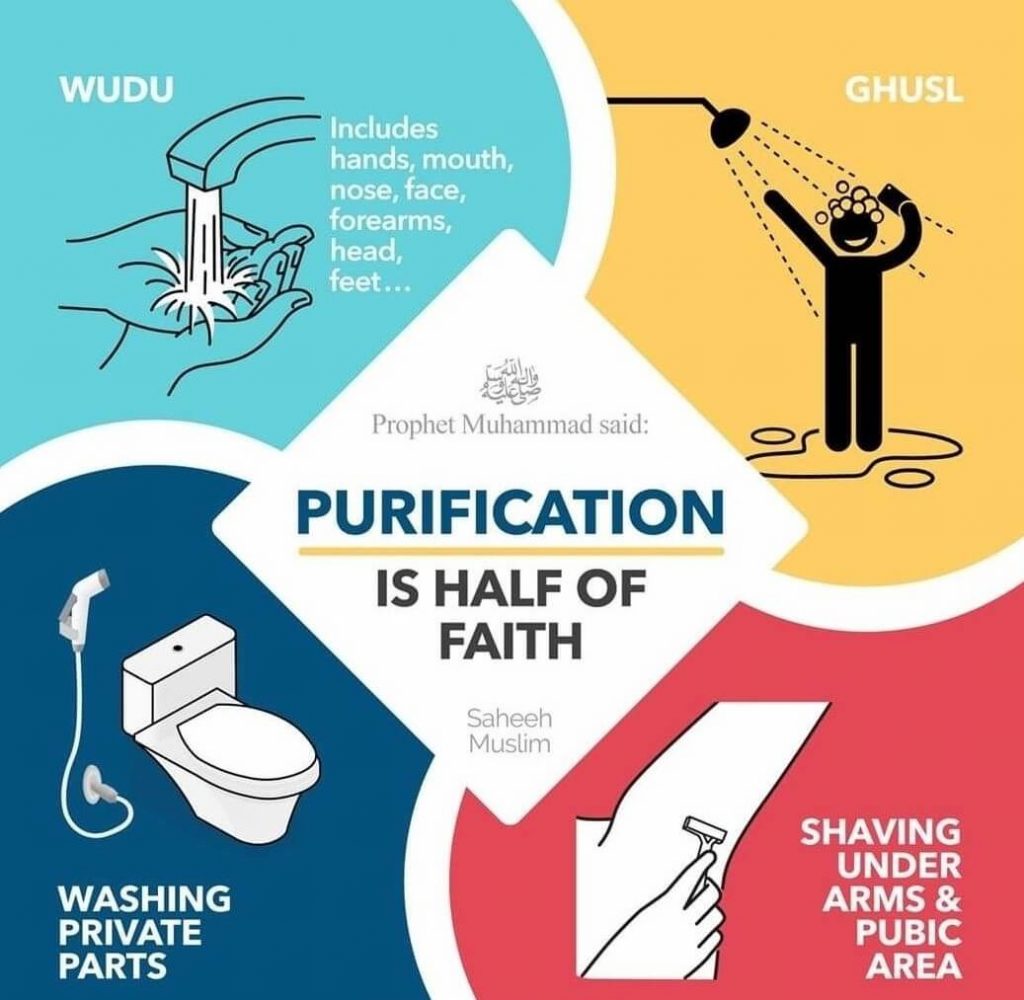
Let’s see how to perform taharah, and how many times of cleanliness are there in Islam:
1-Ghussl- the act of Ritual Bathing:
After having the desire to clean yourself by sincerely making your intention to do it and repeating, “Bismillah (in the Name of Allah),” wash your entire body with water, making sure that water the scalp. Ghussl is required in the following situations: –
- After sexual intercourse (merely, the two organs touch each other).
- Maniy (semen or vaginal fluid) ejection in response to lust, whether awake or in a wet dream.
- After menstruation or postpartum bleeding has stopped.
2- Wudu – the act of ablution:
Before we begin learning how to do wudu, we must first understand why it is vital to do so.
It has been reported that the Prophet, said:
Jabir reported God’s messenger as saying, “The key of paradise is prayer, and the key of prayer is being purified.” [Mishkat al-Masabih]
The severed key has the ability to open doors, and this entire act is predicated on opening doors to good, betterment and prayers in context.
To begin purification, it is necessary to observe istinja, which is refered in the Quran, as the saying goes:
“The Messenger of Allah said: ‘The (following) was revealed about the people of Quba‘: ‘In it (the mosque) are men who love to clean and purify themselves. And Allah loves those who make themselves clean and pure.'” He said: ‘they used to clean themselves with water (after urinating), and this Verse was revealed concerning them.'” [Jami` at-Tirmidhi]
The following Ibn Abbas and Abu Hurayra’s calling is noteworthy that it emphasizes the necessity and value of cleanliness in Allah’s presence.
Istinja is a lexical term that refers to a desire to be cleansed of dirt. It is a religious phrase that refers to cleaning one’s private parts after urinating or having a bowel movement. This is counted as Sunnah al-muakkada cleaning.
How to Perform Wudu (ablution)?
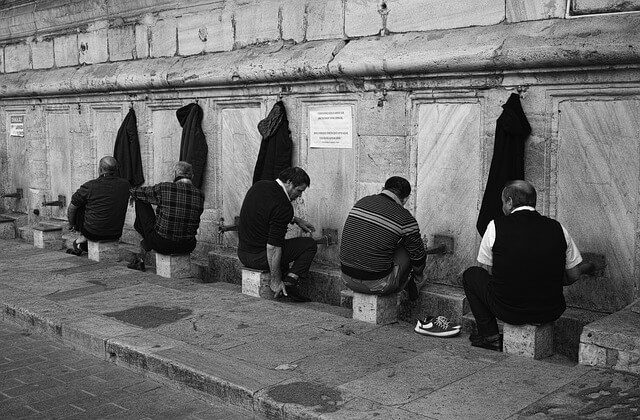
- Make a conscious effort- Niyyah:
Intend to do ablution in your heart, and begin by reciting, “Bismillah (in Allah’s Name).”
- Do a three-time hand washing:
Starting with your right organs, wash the two hands up to the wrists. Make sure the water is running between your fingertips.
- Wash your mouth three times with water.
Rinse your mouth with a handful of water in your right palm, swirling the water within and then spitting it out each time.
- Inhale three sniffs of water into your nose.
Sniff some water into your nose and then expel it with a handful of water with your right palm and blow it out with your left hand.
- Rinse your face three times with water.
Make sure to wash your entire face, from the top of your head to the tip of your chin, and from ear to ear, by cupping your hands together, filling them with water, and applying it to your face.
Note to Self: Beards are considered a part of an individual’s face, so remember to wash your beard all the way down to the skin if you have a thin beard that shows the skin underneath when washing your face. Only the outside surface should be cleansed if it is thick and covers the skin, and it is Sunnah to run damp fingers through it.
- It’s time to splash some water over your head:
Wet your hands and wipe your head from front to back, ensuring that the water sprinkles on the hairs are evenly distributed by splitting the hairs on the scalp.
- Do an once-over cleaning of both ears, inside and out.
Wipe the inside of both ears with your index fingers and the back of your ears with your thumbs while your hands are still moist with the same water.
- Wash your feet three times; perform it all over again:
Wash your right foot from your toes to your ankles. Check to see if the water has reached your toes. Repeat with your left foot with the same actions.
Types of Water Taharah
Before you begin the process of wudu, it is necessary to educate yourself on the different types of water that can be used for taharah purposes.
Allah has indeed explained for His best of the creations in Quran, it’s the water that the whole world is discussing for, the form that gives life and growth to all the organisms:
And Allah sends down rain from the sky, giving life to the earth after its death. Surely in this is a sign for those who listen. (16:65)
-The water that outpours from the skies is known to be clean and pure, that gets stored in the river, rock beds, ponds, and water outlets, and this kind is known as mutlaq water that has no mix-ups with any other kind of fluids to change its name.
–Musta’mal water that has been used for some of the purposes and is being re-used.
-Water mixed with pure substances, flower essence, grape juice, and the like, as well as their types and attributes, are not mutlaq water but are known as muqayyad (restricted) water.
–Najis water is a water mixed with impurities, such as urine.
The main way to check it out is to have a look at the three properties of water that is the taste, the smell and the color. If it is seen as the water, then the fluid must be ranked as mutlaq, valid to use for wudu and ghussl.
To note for some of the rules:
- It is allowed to perform an ablution or ghussl with mutlaq water from a deceased animal that has no fluid blood, for example, with water containing a dead bee, scorpion, bedbug, or mosquito.
- It is acceptable to do an ablution or ghussl using water when an aquatic animal dies in it, such as fish, crabs, or frogs.
- A little pool becomes najis (impure) when an animal born on land but living in water, such as a duck or a goose, dies in it.
- Water that has lost all three of its qualities as a result of staying too long does not become najis. If the cause of any foul-smelling water cannot be determined, it will be deemed clean.
- If najâsat (impurities) fall into a river or a large pool, whether visible or not, it is acceptable to do an ablution on any side where any of the three indicators of the najâsat, such as color, smell or taste is not visible.
- Flowing water is counted as clean in all times, as the fluidity of the flowing water stays the same, thus the purity stays intact.
These are general tips for doing taharah, with knowing about the types of water to use it when needed, but in world there can be many scenarios, like what if a person is going through a journey and loses the capacity to hold water and doesn’t find it on the way. What should he be doing? Can he leave the ritual of purification and thus, pray salah instead or is there some other process to make a hearty note about the value of taharah and the bigger philosophy behind it?
Importance of Taharah Looms When you Don’t Have Water?
It could be evident enough by this hadith kareem, and the way the Holy Prophet (PBUH) helped Ammar bin Yasir dealing with the situation of no water, that even in times when there seems a no way out, Islam and Shariah have provided all the solutions. The hadith is as follows:
“Ammar b. Yasir used to tell that when they were with God’s messenger they wiped themselves with earth for the dawn prayer, striking the palms of their hands on the earth, and then wiping their faces once. They struck the palms of their hands again on the earth and wiped their arms completely up to the shoulders, and up to the armpits on the inside of their arms.” [Mishkat al-Masabih]
This is when Ammar bin Yasir told the Holy Prophet about how they had performed the dry ablution, known as tayammum, in Arabic – the way of doing is as follows:
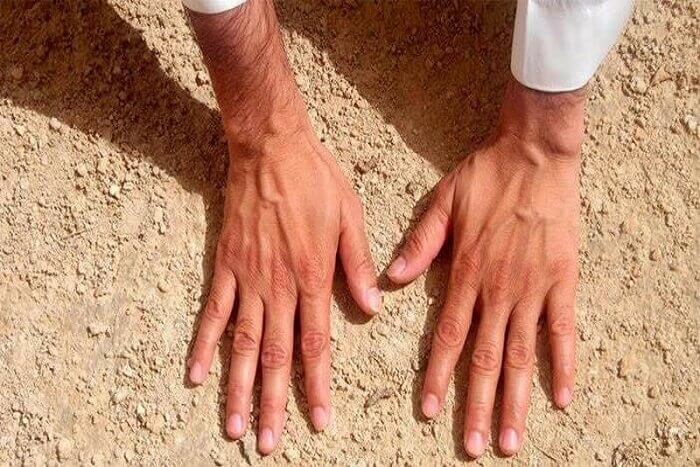
These are the following steps for doing dry ablution, with pure earth from rocks or sand from the base.
- The intention, Niyyah, is first, followed by the recitation of Allah’s name.
- Shake away any excess dust or sand after striking both palms of your hands on the earth (such as dust, sand, rocks, pebbles, and clay).
- Using both hands, wipe your face.
- Wipe the right hand with the left hand’s finger, and the left hand with the right hand’s fingers.
The ritual has come to a close.
Are Taharah and Spiritual Purity in Islam Related?
Taking examples from the biology, it is easy to notice that a tree that appears green on the outside has the cells working for it day and night, causing it to grow.
If the outside conditions change, such as direct sunshine, flooding or anything else that could harm the plant, the interior will be affected as well. That is how humans have direct relationship with their surroundings, the heart being at the core, which is related to everything else. This is how it should be a Muslim who should be asking the following questions to himself:
If I am following taharah, am I also focusing on purity and cleanliness in Islam?
If I brush my teeth every day, keep myself clear out of all odor, am I doing the same of my surroundings?
If I am keen to be in wudu all the time, do my thoughts of sin or prevailing negativity go away?
Do I have bad intentions at heart, although I have been aiming to stay on taharah whole of my life?
These pondering points are highly beneficial for anyone’s consciousness to make him reflect on his own deeds, the debates, learning new things from Sunnah, reviewing books and knowing the texts mentioned in the Holy Book. The biggest opportunity in life is the realization to learn; don’t miss out on the courses developed for ardent learners and deep diggers for knowledge; register in Fiqh of Worship course to know more about benefits of taharah, ablution, prayer and so on.
It’s time to think for a better you, hope you start with a clean state of mind! Best of Luck!
Related blogs:
How to Pray Istikhara Step by Step

























